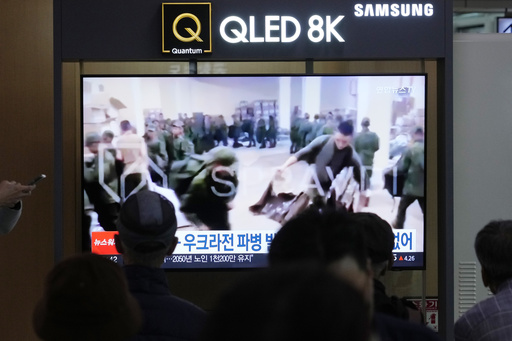
SEOUL, South Korea — Reports indicate that North Korea has deployed thousands of young soldiers to Russia, purportedly to assist in the ongoing conflict against Ukraine. These recruits, primarily from elite special forces units, are causing concern among analysts who speculate about their potential fate on the battlefield. Many worry these inexperienced soldiers could be overwhelmed as they face a lack of combat experience and unfamiliar terrain, making them vulnerable in some of the most intense areas of conflict.
Nevertheless, some former North Korean military members suggest that the young soldiers might not view their situation as dire. Instead, they may perceive the opportunity to serve in Russia as a point of pride. This experience could also provide them with financial incentives and a chance to explore a foreign land for the first time, which could lead to better living conditions for their families back in North Korea.
Lee Woong-gil, a former soldier from the same elite force, believes these young soldiers do not fully grasp the gravity of their situation and are likely to see their deployment as a prestigious assignment. However, he expresses concerns that many may not make it back home safely.
The seriousness of North Korea’s involvement in the conflict was underscored when U.S. defense officials announced that approximately 10,000 North Korean troops were en route to Russia and expected to participate in the fighting in the coming weeks. NATO officials confirmed that some units have already arrived in Russia’s Kursk region, which has been facing challenges from Ukrainian advances.
This troop dispatch could represent a significant escalation in the ongoing war, a situation that has surprised many observers, especially given North Korea’s own ongoing tensions regarding its nuclear arsenal with the U.S. and South Korea.
Should North Korea suffer substantial casualties, it could represent a significant political setback for Kim Jong Un. Nonetheless, experts assert that Kim may view this gamble as a means to acquire much-needed currency and military support from Russia in exchange for North Korean involvement in the fighting.
Analysts observe that while Kim Jong Un stands to gain foreign assistance through troop deployment, the potential for high soldier fatalities could reshape domestic perceptions of his leadership. The Storm Corps, known as one of North Korea’s elite military units, is regarded as crucial for espionage and sabotage missions against South Korea.
Former members like Lee reflect on the challenges faced by the Storm Corps, including insufficient supplies, despite being among the more privileged units. Despite North Korea’s gradual economic recovery over recent decades, average monthly salaries for soldiers and laborers fall below the $1 mark, forcing many to seek out supplementary income through informal markets.
Russia is anticipated to cover expenses associated with the North Korean forces, including wages of at least $2,000 per soldier. Experts believe that while a significant portion of these wages will flow back to the North Korean government, the financial incentive could encourage young soldiers to volunteer for this perilous mission.
Furthermore, the North Korean government may provide additional benefits to soldiers, such as promotions within the ruling Workers’ Party and the possibility of relocation to Pyongyang. These incentives could include better housing or educational opportunities for soldiers’ families, according to defectors familiar with the regime’s practices.
Choi Jung-hoon, a former North Korean military officer, noted that many of the enlisted personnel may be eager for the chance to experience life outside of their isolated nation, where foreign news is restricted and travel between provinces is tightly controlled.
While North Korean laborers sent abroad in various capacities have been described as “slaves” by human rights advocates, defectors often report that these oversees jobs surpass the conditions available in North Korea.
Ahn Chan-il emphasized the unique perspective of these soldiers, suggesting that participation in the Russian initiative might present them with a rare opportunity. However, if they face heavy losses, this perspective may quickly shift.
Military experts indicate that North Korean soldiers, accustomed to the mountainous landscape of their homeland, may struggle in the flat terrain of Ukraine. Additionally, their lack of exposure to modern warfare tactics—such as drone operations—could further jeopardize their effectiveness in combat, as North Korea has not engaged in a large-scale battle since the Korean War.
Choi expressed his heartbreak at videos showing young soldiers, who appear to be in their late teens or early 20s, indicating a grim situation.
Leader Kim Jong Un may also be hoping that North Korean participation will lead to Russia sharing advanced military technology, crucial for the development of Pyongyang’s nuclear capabilities. The potential exchange of technology may depend on both the duration of the conflict and the continued deployment of troops.
Nam Sung-wook, a former think tank director, predicts that North Korea could accrue significant financial benefits from the soldiers’ wages. However, he warns that heavy losses are likely, which could limit the exchange of sophisticated technology from Russia, ultimately affecting North Korea’s military advancements.
Furthermore, it is anticipated that the North Korean government will seek to keep troop deployments a secret from its citizens to avoid backlash from families regarding the potential fates of their soldiers.
